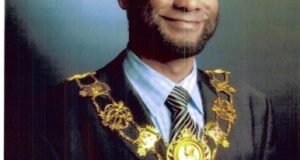Fatema Miah:
I explained Hudud versions/branches after Fatwa. There the differences (of Shari’a Hudud) the Fiqh sub branches, allow understanding of what can and cannot be changed. In addition to this, further breaking Fiqh down to sub branches; Ibadat, Mu’smalat, Ijtihad, Maslahah and Ikhtilaf; allow better understanding to achieve Fairness, to promote kindness, and for justice, they provided a logical basis for appropriate changes (over and with time) to take place. Fiq is a very sound and elegant approach admitted western people.
By defining Islamic Feminism as an affirmation of women’s humanity and not a put-down or undermining of men’s humanity is also another stroke of genius as humanity is a sound basis for equality to exist to bring about kindness, fairness and justice. By incorporating Islamic law into modern legal systems can also take many forms. Usually, if Islamic law is included in a legal system it is confined to the realm of family law.
There a first Muslim female Qadi Sharia court Judge in Palestinian constitute and she has given us an insight into some of the issues that arise with Islamic family law as it currently exists in the Palestinian context. It’s known that Islamic law, as human beings’ best efforts to understand the Sharia, is potentially open to change. This distinction between the Sharia on the one hand and Islamic law on the other and is mobilised by a number of civil society organisations to promote positive change throughout the world.
The gender discrimination isn’t Islamic rather contrary the opposite. Gender discrimination is Middle- western phenomenon. It was a different scenario in East. The Muslims in the east have interlinked Islam with their regional culture there. In the Middle east and Europe, it was Israelis the medieval Jews culture from milleniums ago. Therefore in Arab and Europe have conflict of idealogy and reflect same reactionsm with different adopted ideal termology.
The gender fight began in West in the modern era in the name of equality by the priviledge. In seeking of equality, where is justice placed? Inequality is prominent and in increasing of gap between the rich and poor. Worse of it the underprivileged are suffering it all in West, East and in so called Muslim countries. The gender equality seeking women are from and living in Privileged class allowing their men having hand in dictation and they fulfilling their power seek. Islamic law Fiq meant to apply all covering all aspect to balance justice for humanity against suffering. Where is Fiq?
Musawah (Equality) part of Fiq. Fiq I already wrote in my previous article is part of Hudud the Islamic law, what is known as Sharia. Equality is still in question in the western world. When our western beings are proudly dancing on word equality specially gender equality in the west by contrast to Muslim world for example Arab region the highlighted Kingdom of Saudi Arabia, women in west are freed from fabric wrapped around, in another word, lessen in fabric in dressing code, that too to was for men to lessen men’s burden, to cut shortage in fabric material production. In real term in uk and USA, women are into every field of professions to input both physically and intellectually and salary scale remained drastically gender discriminative.
There are organisations on these different Fiq sub branches/ parts. One of the most prominent of these organisations is called Musawah (equality). Musawah was launched in Kuala Lumpur in 2009. It is a collection of Islamic scholars, legal practitioners, academics, and activists who aim to mobilise the Islamic tradition’s own internal resources in the realm of women’s rights to promote legal change.
Musawah seeks to promote awareness of the distinction between the Sharia and Islamic law (Fiq) to encourage change. Here Islamic Feminism comes in question. One of the founders of the Musawah movement is Dr. Ziba Mir-Hosseini, a specialist in Islamic Family Law (University of London). In the 1990s, Dr. Mir-Hosseini coined the termed “Islamic Feminism”. Watch this short interview with Dr. Mir-Hosseini as she gives a definition of this term.
Changes, is that must to suit as a fashion word to prove there is rigid, or old fashioned. Why change and change what? In every ‘change’ uprising have we seen actual equality yet? There gender change took physical form as right of hoice and is there total equality rights with totall happiness delivered? Where is any education and example, other than in term of Dr Mir Hussaini on Musawah and how Fiq must be explained, or be implaced?
Fiq is to ponder in to the Hudud law to apply, or make it applicable circumstantially equally in every sub branches of Fiq from Ibadah the rituals to equality, change (make and accept) and justice. It’s begin from Ibadah rituals, as well as for health, time suitability and status accountability there are climatic to celestial aspects comes into consideration in rituals, for example of fasting seasons and regions, all and more comes in Fiq. Fatema Miah, Solihull, uk. fatemamiah@mail.com
 Weekly Bangla Mirror | Bangla Mirror, Bangladeshi news in UK, bangla mirror news
Weekly Bangla Mirror | Bangla Mirror, Bangladeshi news in UK, bangla mirror news






